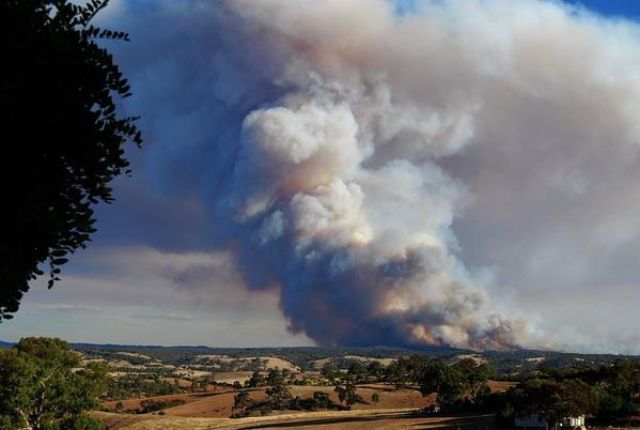
A bushfire that swept through the Adelaide Hills in early January has destroyed 27 homes, ravaged the local environment and killed many pets and animals.
Large smoke plumes were visible from the Adelaide CBD and several Adelaide suburbs were evacuated.
It is similar to other severe fires, such as in the Blue Mountains in NSW last year and the Black Saturday bushfires in Victoria in 2009, which climate scientists say will occur more frequently.
With increasingly extreme weather conditions becoming more common, firefighters face more intense fires more often and enjoy ever-decreasing off-seasons.
NSW Fire Brigade Employees’ Union state secretary Jim Casey has called for international action on climate change and said taking action against climate change would help firefighters.
He argued in the Guardian that the nature of bushfires is changing with the climate and firefighting must follow it. Preventing, rather than fighting an already-burning fire is a better course of action for modern firefighting.
As the fire seasons increase not only in their severity but also in their duration, preparation and prevention becomes a more difficult task than ever before.
Greens leader Christine Milne has pointed out the economic toll bushfires cause in the form of destroyed infrastructure. Entire communities can be crippled by the damage bushfires have caused.
The federal government has announced a plan for disaster recovery payments of $1000 for adults and $400 for children in addition to a thirteen-week Centrelink allowance that is to be made available to anyone who has had their income severely impacted by the Adelaide Hills fires.
Those who have lost their homes and whose lives were impacted by this latest fire disaster may find this payment to be some measure of comfort but without meaningful action, the cycle of disaster and rebuilding will continue.
The Climate Council released a report in October that said hot days have become more frequent and more intense and that heat waves have become longer over the past 30 years. The report also highlights the significant economic cost of bushfires, which it claims will triple within the next 35 years.
Grassroots climate groups are taking it into their own hands to get the message across. Gemma Weedall from the Climate Emergency Network of South Australia said: “Climate change is already increasing the frequency and severity of bushfires and other extreme weather events in Australia and this dangerous trend will continue unless we change paths.
“We need strong action on climate change for the health and safety of of our communities and to reduce the risk of more tragedies like the recent bushfires.
“This means leaving fossil fuels in the ground, coupled with a swift transition to renewable energy and increased funding for public health responses and emergency services.”
Like the article? Subscribe to Green Left now! You can also like us on Facebook and follow us on Twitter.